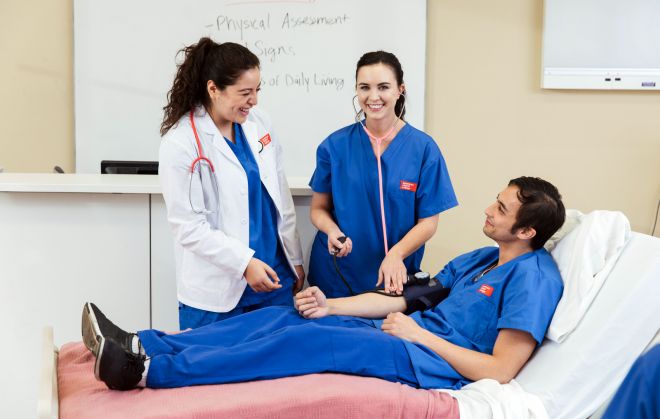- Home
- Programs[+]
- Getting Started[+]
- Why ACC[+]
- Locations[+]
- Newsroom[+]
- Contact Us
03/27/2020

As healthcare service needs continue to rise, we can expect the demand for licensed vocational nurses (LVNs) expected to grow. According to 1the Bureau of Labor Statistics (BLS), there are already 64,000 practicing LVNs within the state of California. Overall, it’s been predicted the field will balloon 11% by 2028, a much higher rate of growth than other niches will likely experience.
With nurses serving as the backbone of the healthcare industry, we can expect extended care facilities to face a growing demand for LVNs and LPNs.
If you are passionate about serving people and helping families cope with unforeseen medical circumstances, you might want to consider a career as an LVN. Below, we answer some of the most common questions people ask about LVN programs.
8 Questions About Licensed Vocational Nursing Programs
LVN stands for licensed vocational nurse. If you want to become a licensed vocational nurse, you must graduate from a recognized LVN program. You can generally find such programs offered at state-approved vocational colleges, community colleges and private institutes.
An LVN program is designed to help you graduate with the confidence and qualifications to begin your career as a licensed vocational nurse. A good vocational nursing program will deliver solid foundational knowledge to prepare students for the National Council Licensure Examination (NCLEX-PN). Students must past this test to legally practice as an LVN.
The program should also provide students with the knowledge and skills needed to land an entry-level vocational nursing position in a clinic, acute care hospital, medical office, HMO, long-term care facility, or other healthcare settings.
Subjects like human anatomy and physiology, first aid, pediatrics, surgical nursing pharmacology, diet and nutrition, geriatrics, obstetrics, psychology and mental health, patient care, social sciences, statistics, and mathematics are all covered in a typical LVN program.
An LVN program generally offers the following classes and course modules:
If you would like to explore the training objectives, program outline, and details of modules of an LVN program from an accredited institute, check out the Vocational Nursing program at ACC (American Career College).
Licensed vocational nurses (LVNs) are vital to any healthcare team. The duties of an LVN may include any of the following tasks:
In addition to these duties, it’s important that LVNs demonstrate skills such as leadership, supervision, and holistic patient interaction.
While licensed vocational nurses don’t need a college degree in order to practice, they do need to undergo training and receive a certification from an accredited college or institute.
Different vocational nursing colleges offer different types of training programs. You will find that some institutes offer a non-degree diploma in the subject, while others offer an associate’s degree or a certificate.
Yes, both RNs and LVNs fall under the umbrella of nursing. There are certain RN duties, such as administering IV drugs or completing a health assessment, that LVNs are not permitted to do on their own. However, LVN nurses maintain a number of important responsibilities.
Here’s a list of nursing personnel ranked from positions requiring the lowest to the highest amount of training and responsibilities:
The titles are essentially the same. Licensed vocational nurse (LVN) is used specifically in Texas and California. In all other states, licensed vocational nurses are known as licensed practical nurses (LPNs).
Typically, most LVN programs can be completed in about 12 months. However, state-approved programs provide the number of clinical hours that are necessary to meet the certification requirements of your state. Depending on your state and chosen criteria, it can sometimes take anywhere between one to two years to become a Licensed Vocational Nurse.
A rewarding career awaits for those who decide to enroll in an LVN program. As an LVN, you’ll have the opportunity to collaborate with diverse healthcare teams and experience serving different patient populations.
We hope this article helped clarify any confusion and will help you make informed decisions for your future. All the best!
ACC cannot guarantee employment. Programs vary by campus. The views and opinions expressed are those of the individuals and do not necessarily reflect the beliefs or position of the school or of any instructor or student.
Share this story:
« Previous Post Next Post »* Required field

Ontario Campus: Voted Best Trade School in the 2021 Inland Valley Daily Bulletin Readers Choice Awards

LA Campus: Voted Favorite Career College in the 2021 LA Daily News Readers Choice Awards.

OC Campus: Voted Best Career College in the 2021 San Gabriel Valley Tribune Readers Choice Awards.
Personal Information you submit through our Sites, such as your name, address and other contact information, may be collected by American Career College for internal marketing and development purposes as well as to respond to your inquiry, complete a transaction for you, or fulfill other forms of customer service. You can choose not to receive marketing from us by "unsubscribing" using the instructions in any marketing email you receive from us.

